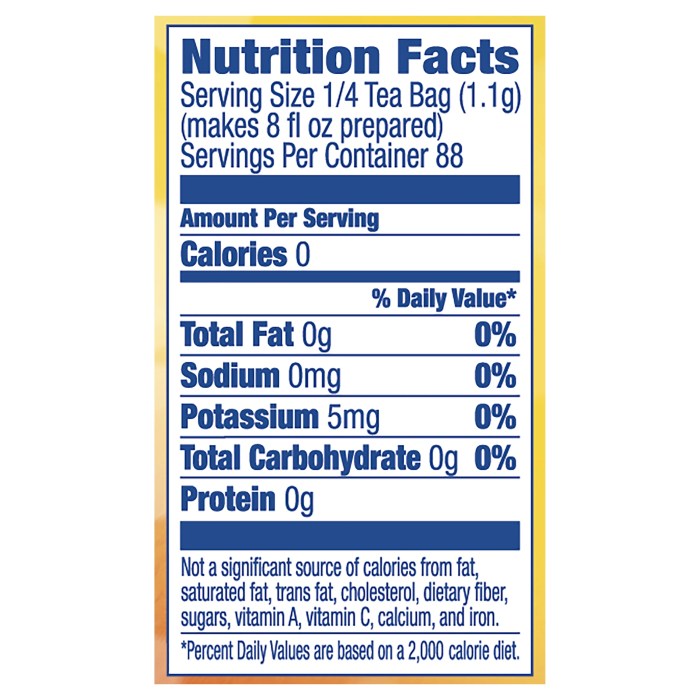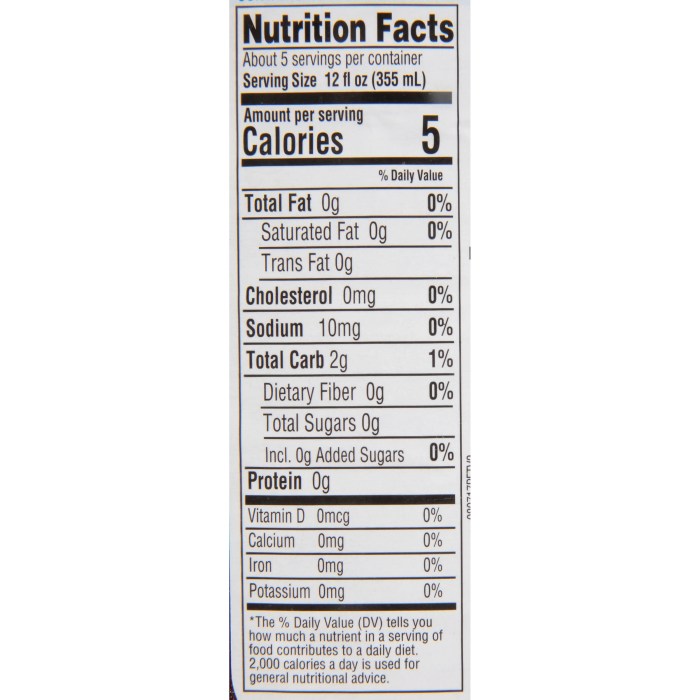Calorie Count and Nutritional Breakdown

Nutrition facts for 30 oz sweet tea – Understanding the nutritional content of a 30 oz serving of sweet tea is crucial for making informed choices about your beverage intake. This large serving size significantly impacts the overall calorie and carbohydrate content compared to smaller servings. The specific nutritional breakdown will vary depending on the type and amount of sweetener used.The calorie count in a 30 oz sweet tea is largely determined by the sweetener.
Common sweeteners include granulated sugar and high-fructose corn syrup (HFCS). Both contribute significantly to the overall calorie and carbohydrate content, but HFCS often contains a higher percentage of fructose, which can have different metabolic effects compared to glucose (a component of sugar). Other ingredients, such as lemon juice or other flavorings, contribute minimally to the overall nutritional profile.
Sweetener Impact on Nutritional Profile, Nutrition facts for 30 oz sweet tea
The choice of sweetener dramatically alters the nutritional profile of sweet tea. Using granulated sugar results in a higher proportion of sucrose (glucose and fructose combined), while HFCS typically provides a higher proportion of fructose. While both add significant calories and carbohydrates, the different ratios of glucose and fructose might impact how the body processes and stores these sugars.
For instance, excessive fructose consumption has been linked to increased risk of metabolic issues. A 30 oz sweet tea sweetened with sugar might contain a slightly different carbohydrate breakdown compared to one sweetened with HFCS, but both will contribute substantially to daily sugar intake.
Nutritional Information for a 30 oz Serving of Sweet Tea (Estimated Values)
The following table provides estimated nutritional information for a 30 oz serving of sweet tea, assuming it’s sweetened with a typical amount of sugar. These values are approximate and can vary depending on the specific recipe and ingredients used. It is crucial to check the nutritional information provided by the specific brand or restaurant you are purchasing from.
| Nutrient | Amount per 30 oz serving | % Daily Value | Health Impact |
|---|---|---|---|
| Calories | Approximately 450-600 | 22.5%
Determining the precise nutrition facts for a 30 oz sweet tea can be tricky, as it varies significantly by restaurant and recipe. For a comparison, you might find it helpful to check out the detailed nutritional information available on sites like nutrition facts Wendy’s , which offers a clear breakdown of their menu items. This helps illustrate the range of caloric and sugar content you might encounter in similarly large, sugary beverages, providing context for assessing your 30 oz sweet tea.
|
High calorie intake can contribute to weight gain if not balanced with adequate physical activity and overall calorie consumption. |
| Carbohydrates | Approximately 110-150g | 37%-50% (based on a 2000 calorie diet and 275g of recommended carbohydrates) | High carbohydrate intake, particularly from added sugars, can increase blood sugar levels and contribute to various health issues if consumed in excess. |
| Sugar | Approximately 100-140g | N/A (no established daily value for added sugar) | Excessive sugar intake is linked to weight gain, type 2 diabetes, heart disease, and other health problems. The American Heart Association recommends limiting added sugar to no more than 25 grams per day for women and 36 grams per day for men. |
| Fat | 0g | 0% | Sweet tea typically contains no fat. |
| Protein | 0g | 0% | Sweet tea typically contains no protein. |
Health Implications of Frequent Consumption

Regular consumption of large quantities of sweet tea, particularly a 30-ounce serving, poses several potential long-term health risks due to its high sugar content. The excessive sugar intake contributes significantly to weight gain, increases the risk of developing type 2 diabetes, and can negatively impact cardiovascular health.
Understanding these risks is crucial for making informed choices about beverage consumption.The high sugar content in sweet tea is the primary driver of many of its associated health risks. Added sugars provide empty calories, meaning they offer little to no nutritional value beyond energy. When consumed in excess, these calories contribute to weight gain, especially when not balanced by sufficient physical activity.
This weight gain, in turn, increases the risk of developing various health problems.
The Role of Added Sugar in Type 2 Diabetes
Excessive sugar consumption is a significant risk factor for type 2 diabetes. The body processes added sugars differently than natural sugars found in fruits and vegetables. Regular intake of high-sugar beverages like sweet tea can lead to insulin resistance, a condition where the body’s cells become less responsive to insulin, the hormone responsible for regulating blood sugar levels.
Over time, this insulin resistance can result in persistently high blood sugar levels, characteristic of type 2 diabetes. Studies have consistently shown a correlation between high sugar-sweetened beverage consumption and an increased risk of developing this chronic condition. For example, a large-scale study published in the “American Journal of Clinical Nutrition” found a strong association between sugary drink intake and the incidence of type 2 diabetes.
The Impact on Cardiovascular Health
Frequent consumption of sweet tea can also negatively impact cardiovascular health. High sugar intake is linked to increased levels of triglycerides and low-density lipoprotein (LDL) cholesterol, often referred to as “bad” cholesterol. Elevated levels of these substances contribute to the buildup of plaque in the arteries, a process known as atherosclerosis. Atherosclerosis can lead to various cardiovascular problems, including heart disease and stroke.
Furthermore, the high sugar content can contribute to high blood pressure, another significant risk factor for cardiovascular disease. Many observational studies have demonstrated the association between high sugar intake and an increased risk of cardiovascular events.
Healthier Beverage Alternatives
Choosing healthier alternatives to sweet tea can significantly reduce the risks associated with high sugar consumption. Many refreshing beverages offer similar hydrating and thirst-quenching qualities without the detrimental effects of excessive added sugar.Choosing healthier alternatives is essential for maintaining overall health and well-being. Below are some examples:
- Unsweetened Iced Tea: Provides the refreshing taste of tea without added sugars. It contains antioxidants which can benefit overall health.
- Water Infused with Fruit: A naturally sweet and hydrating option. Adding cucumber, berries, or citrus fruits to water enhances its flavor and provides added vitamins and antioxidants. For instance, cucumber water is known for its refreshing taste and potential diuretic properties.
- Unsweetened Sparkling Water: Offers a bubbly and refreshing alternative to sugary drinks. It’s calorie-free and can be flavored with natural extracts or fruits.
FAQ Compilation: Nutrition Facts For 30 Oz Sweet Tea
Can I reduce the sugar content in my homemade sweet tea?
Yes, you can easily reduce the sugar by using less sweetener or opting for natural sweeteners like stevia or honey in moderation.
Is diet sweet tea a healthier option?
Diet sweet tea often contains artificial sweeteners, which have their own potential health implications and are still a subject of ongoing research. While it reduces sugar, it’s not necessarily a universally healthier alternative.
How many servings of sweet tea are considered moderate consumption?
Moderate consumption is subjective and depends on individual health goals and overall dietary intake. However, limiting sweet tea to occasional small servings is generally recommended.
What are some healthy alternatives to sweet tea?
Unsweetened iced tea, infused water with fruits and herbs, sparkling water with a squeeze of citrus, and diluted fruit juices are all refreshing and healthier alternatives.
